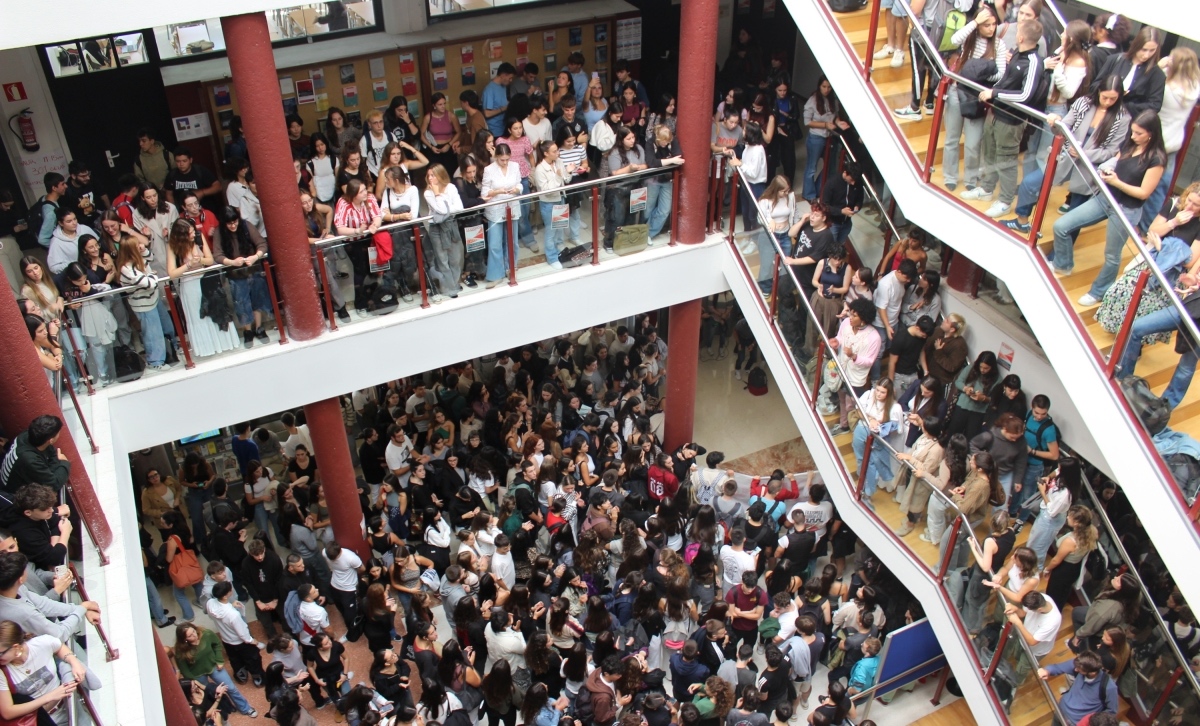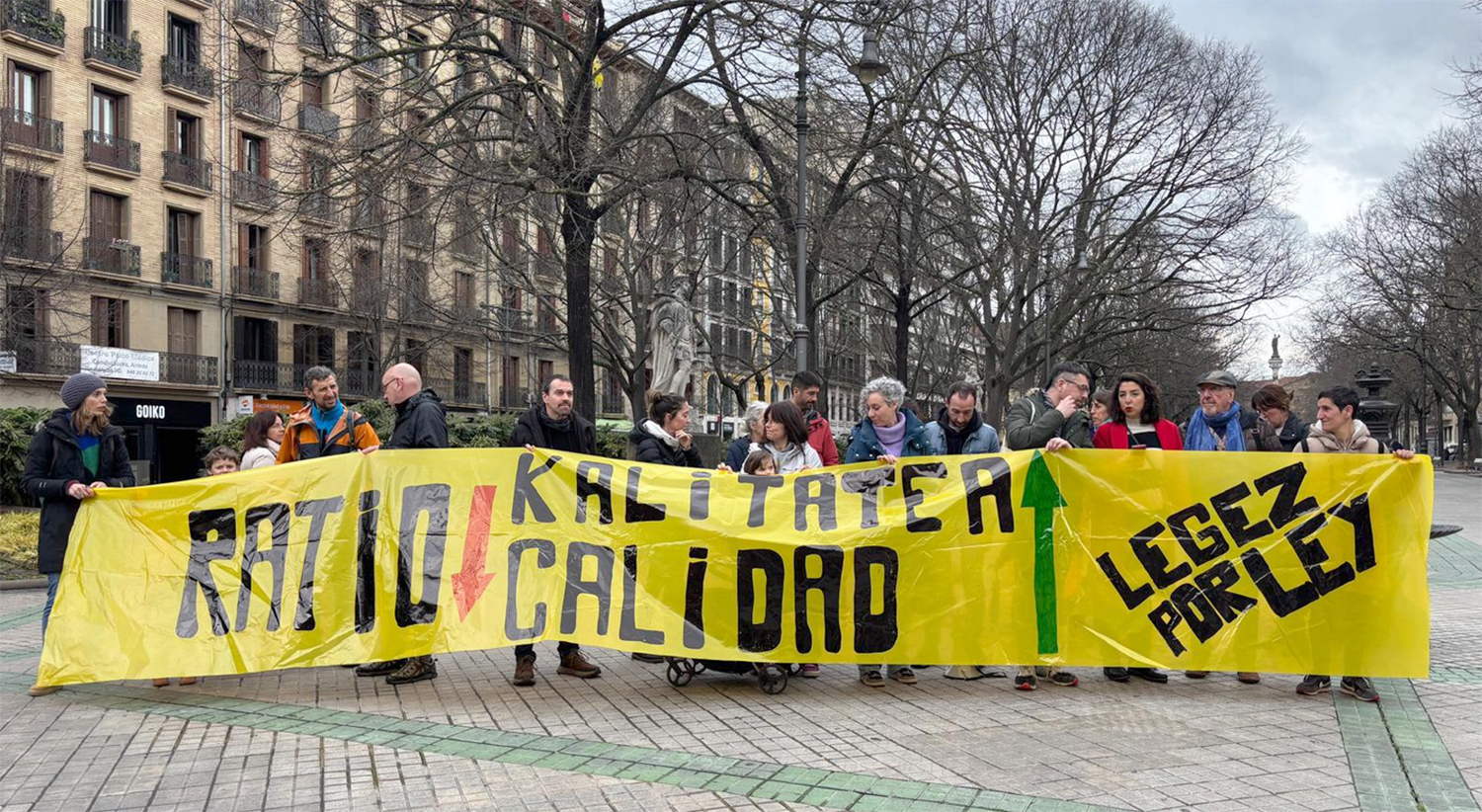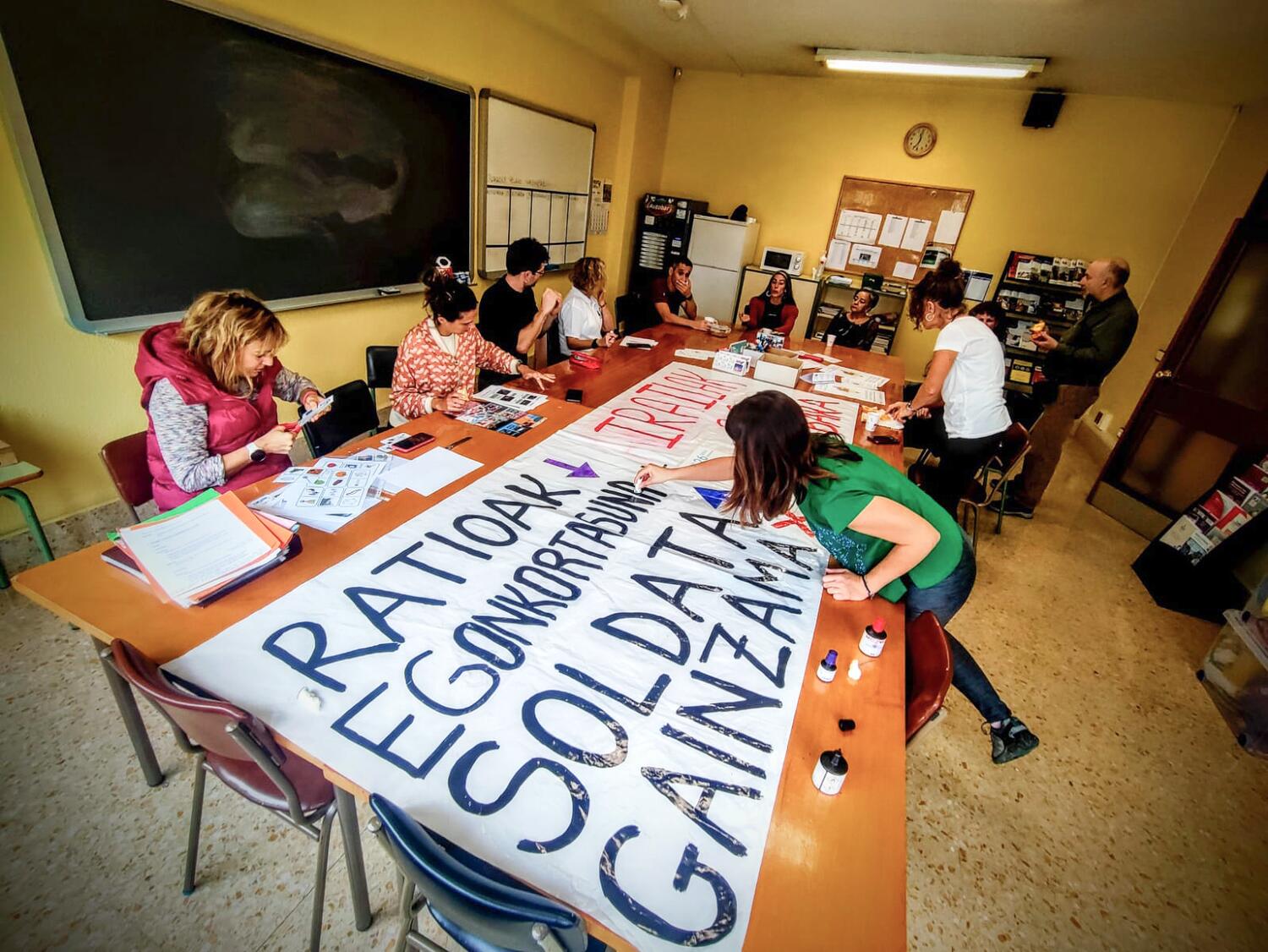Not mobiles, but the Chromebook does?
- “We tell young people to spend less time in front of the screen, and at the same time we force them in the middle to connect to digital devices.” The Off movement has highlighted the need to curb digitisation processes in schools and to reflect on the control and influence of technology not only on education.

Beyond mobiles, tablets, computers and screens in general, the citizens’ movements that are gestating, have highlighted the need to reflect on the preponderance of our lives. The off movement was born a few months ago in the Spanish State and has received numerous supports, among which are the signatories of the declaration of Euskal Herria. They claim that technological development is at the service of human beings, not the other way around, and denounce the control of technology led by the interests of big companies, the “indiscriminate use of technology” and the “violation of personal data”. They say that in the face of each new technology it is necessary to establish protocols, guarantee the possibility of disconnection, promote training…
“Education should help limit hyperconnection”
The Off movement has placed a special focus on education and on children and youth. Education should help reduce hyperconnection, not increase, but if it's not that we're often blindly falling into the glow of digital technology, in the name of modernity. On the contrary, more than one voice has already questioned the belief that technology will favor education per se, and on the contrary, they have warned that it can be harmful in several areas (on the subject we write in depth in ARGIA: That fascination with technology does not disgust education).
The Off movement puts forward five proposals for education: to ensure that learning books are always in paper format; to use screens in the classroom only in exceptional situations (other than digital devices are part of the daily routine); to ensure the right to disconnect students, families and teachers; to make digital an object and not a learning resource; and until this is achieved, to offer a non-screen alternative: to offer a line without screen at all levels for families.
One of the proposals is to offer a line without screen at all levels for students who request the right to disconnect
Are we evaluating the digitization of schools?
In the French state there are also movements concerned about the speed of the implementation of digital technologies in education. “We have made tablets and digital devices the only privileged or privileged element of learning and, in this way, we encourage students to use these devices for everything and everything; we do not turn children into informed users, but into captive consumers subject to algorithms,” says the group of agents from the educational community CoLINE, as we counted in ARGIA. They have denounced the normalisation of over-exposure to school screens and have written to the French Minister of Education asking for debate and reflection on the process of digitisation being carried out in schools: “The French Ministry of National Education assesses everything except the use of technology. For years, the High School 4.0 model has been widespread in several schools, and they do not intend to assess the impact, but to question it is to go against progress.”
"No entiendo, en castellano por favor" eta gisakoak ohikoak dira eskolako guraso Whatsapp taldeetan, baina Irungo Txingudi ikastola publikoan euskara hutsean aritzeko modu erraz eta eraginkorra dute, behar duenarentzat itzulpen sistema berehalakoa ahalbidetuta.
Ez dakit nondik hasi, egia esan. Ordezkoa naizen heinean –irakaskuntzan ikasturte gutxi batzuk daramatzat lanean– eskola ugari ezagutu ditut Nafarroa, Bizkai eta Araban zehar. Lankide izan ditudan irakasleekin euskal eskolak dituen gabezien inguruan hitz egiten... [+]
“Gogo eta gorputzaren zilbor-hesteak: bi kate. Bi kate, biak ebaki beharrezkoak: bat gorputzaren bizitzeko, bestea gogoaren askatzeko”. Hala dio Mikel Laboaren kantak; hala izan da belaunaldiz belaunaldi, egun arte.
Gogoan dut nire gurasoak askotan joaten zirela... [+]
Matxismoa normalizatzen ari da, eskuin muturreko alderdien nahiz sare sozialetako pertsonaien eskutik, ideia matxistak zabaltzen eta egonkortzen ari baitira gizarte osoan. Egoera larria da, eta are larriagoa izan daiteke, ideia zein jarrera matxistei eta erreakzionarioei ateak... [+]
Elgarrekin izena du Duplak egin duen aurtengo abestiak eta Senpereko lakuan grabatu zuten bideoklipa. Dantzari, guraso zein umeen artean azaldu ziren Pantxoa eta Peio ere. Bideoklipa laugarrengo saiakeran egin zen.
Leporaturikoa ez onarturik, eta sare sozialetako kontuak "lapurtu" zizkiotela erranik, salaketa jarri zuen Arabako campuseko Farmazia Fakultateko irakasleak. Gernikako auzitegiak ondorioztatu du ez dagoela modurik frogatzeko mezu horiek berak idatzitakoak diren ala ez.
Seme-alabek eskolan dituzten ratioekin kezkatuta, Arartekoari kexa helarazi zion guraso talde batek, eta orain zuzenean Parlamentuari egin diote eskaera, “legez berma dadin gure seme-alaben hezkuntzaren kalitatean oinarrizkoa den neurria, unean uneko aurrekontuez edo... [+]
Ikasleen lan politikoa jazartzeko asmoz, Iruñeko Iturraman eta Biurdanan nahiz Bilboko Unamunon izan dira polizia-indarrak, IAk salatu duenez.
Memoria eta Bizikidetzako, Kanpo Ekintzako eta Euskarako Departamentuko Memoriaren Nafarroako Institutuak "Maistrak eta maisu errepresaliatuak Nafarroan (1936-1976)" hezkuntza-webgunea aurkeztu du.
570.000 familiak euren haurren ikasgeletako hizkuntza nagusia zein izango den bozkatzeko aukera dute martxoaren 4ra arte: gaztelera edo katalana. Garikoitz Knörr filologoaren eta euskara irakaslearen arabera, kontsultak "ezbaian" jartzen du katalanaren zilegitasuna... [+]
Uribe Kosta BHI institutuko hainbat ikaslek salatu duenez, mezu "iraingarriak, matxistak eta homofoboak" jaso dituzte Batxilergoko beste ikaskide batzuengandik. Horrez gain, gaineratu dute mezuak irakasle bati ere bidali dizkiotela eta beste ikasle batzuen... [+]
Aiaraldeko hainbat irakaslek mezua igorri diete ikasleen guraso eta familiei, dagoen informazio zurrunbiloan, grebarako arrazoiak modu pertsonalean azaltzeak euren borroka eta lanuztea hobeto ulertzeko balioko dielakoan.
Euskal hezkuntza sistemaren itunpeko eskolen gainkontzertazioa eta zentro pribatuen umeak hartzeko gaitasuna beherakada demografikoari eta biztanleriaren klase osaketari egokitu behar dira.
Grebaren bezperan Hezkuntza Sailak “edukirik gabeko” mahaia deitu zuela eta sindikatu deitzaileak “errespetatu gabe” akordioa “antzezteko” gutxiengoa duten sindikatuak “erabili” nahi izan zituela salatu ostean, beste bi greba... [+]
Nola azaldu 10-12 urteko ikasleei bioaniztasunaren galerak eta klima aldaketaren ondorioek duten larritasuna, “ez dago ezer egiterik” ideia alboratu eta planetaren alde elkarrekin zer egin dezakegun gogoetatzeko? Fernando Valladares biologoak hainbat gako eman dizkie... [+]


















